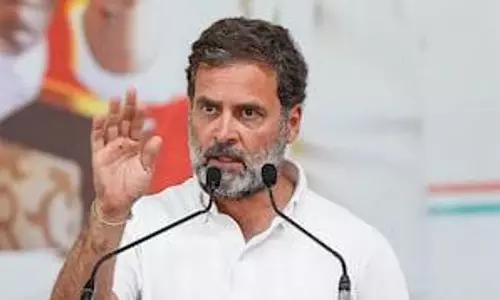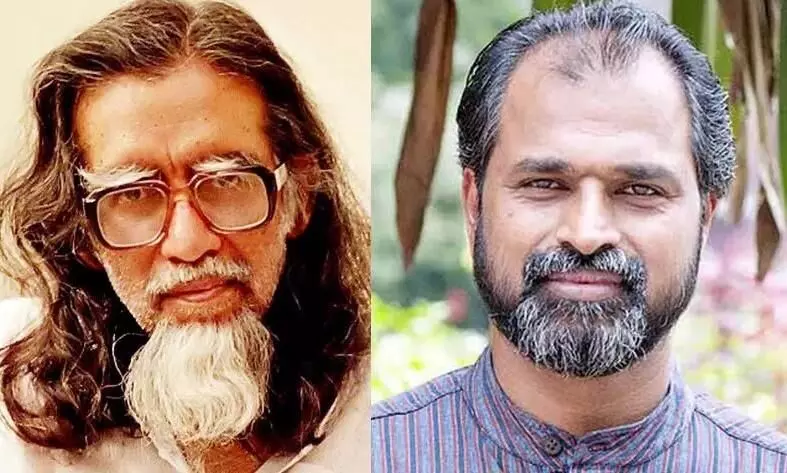
Let us close the universities and build shopping malls
text_fieldsNovelist late OV Vijayan and Dr PK Rajasehkharan (file images)
The last time I was told in no uncertain terms to mind my own bloody business was around 25 years ago when in my youthful insolence, I had the temerity to speak up for a mentor in journalism.
Sitting in a plush office before a symbol of unquestioned authority, the whiplash of an admonition ("it is none of your business") made me feel small and I resolved that I will never speak out of turn. Since then, I have tried to mask my immature urge to poke my nose into the affairs of others with a studied silence that is prized in our country. A quarter century later, I am back in that same room but this time willingly and fully prepared to accept the "none-of-your-business" rebuke and worse, including from those who I look up to, admire and respect.
First things first. I am not questioning for a minute the decision to appoint Sunil P. Ilayidom as a university teacher. Neither am I casting any doubt on the propriety of recruiting Ninitha Kanicheri. One – and the main -- reason is that I have not seen any evidence of any act of commission on the part of either Ilayidom or Kanicheri to undermine the selection process.The second reason that I am not qualified to comment on such issues is because I made a personal decision not to pursue academic studies beyond graduation in Kerala University and left the state in 1990. My lack of understanding about such matters, including reservations in academics, had made me jump to some wrong assumptions. When the mistake was pointed out to me, I had apologised to the person concerned. Every day brings a new lesson.
I now work in Kolkata as a journalist -– a profession that requires neither a good education nor any particular set of skills other than a thick skin and a thicker liver. While my relatively average education disqualifies me from sitting in judgement on events at the high table of education, I believe my very shortcoming also qualifies me to say what I want to say below. Hence, this long preamble. At 52, I now regret not having studied more, especially the literature and the history associated with Kerala. I try to make amends by listening online to lectures -– after 2am once the newspaper I work for goes to the press. Last night, I left for home after 4am.
Most of the lectures that mesmerise me (fatigued and famished at the late hour) are delivered by Dr P.K. Rajasekharan. If he could hold my attention for two hours at such hostile conditions, there must be something arresting in what he says and the manner in which he says it. I must have first "seen" Rajasekharan when I was a boy because he stays near Malayankizh, which is less than 5km from Peyad, where I used to stay. Both are on the fringes of what used to be Thiruvananthapuram city (I am not sure if the official status of the "city" has been extended to Peyad now.) I wrote I "saw" Rajasekharan because he cut an intimidating figure with his piercing, if not intimidating, eyes in the KSRTC bus that we used to take to go school (in my case) and college (in his case). Only two years separate us, but as I had mentioned, I have an immature streak and my pursuits then could not be classified as either respectable or scholarly.
I was addicted to pulp fiction: James Hadley Chase (absolutely unhealthy for children), westerns populated by gunslingers, Alistair MacLean characters who could punch, stab, slash and shoot their way out of trouble, not to mention Kottayam Pushpanath adventures. In hindsight, I am sure Rajasekharan had also passed through a similar phase. But when I "saw" him first in the overcrowded bus, his blazing eyes made me assume that he would neither suffer fools nor brook nonsense. (How wrong I was I realised only last night when I listened to his last year's museum conversation with Meena T. Pillai. Like me, he used to see Steve McQueen in Sree Vishakh cinema in Thampanoor and spot many pumped-up McQueens during the interval.)
So, in the overcrowded morning bus, I kept my distance, largely compelled by my own insecurities.
Years later, I was introduced to Rajasekharan one night near a 'thattukada'. I think he had stepped out of the Mathrubhumi office, where he used to work. By then, I knew "of" Rajashekharan. He had married my sister's friend who hails from a family with which my parents had a close friendship. Still, I was tongue-tied, this time for a new reason. Somewhere along the line, along with Chase and Maclean, I had also discovered O.V. Vijayan, like most Malayali youths. Youthful exuberance sometimes makes you reckless -– possibly a reason I summoned the courage to call on Vijayan in New Delhi while I was learning the craft (not the academic moorings) of journalism.
Vijayan treated me with enormous kindness, overlooking my utter inability to discuss literature (mostly he told me stories and I listened, which I am reasonably good at). I also discovered that one Rajasekharan was literally breathing, eating and sleeping Vijayan's works. When I realised it was the same Rajasekharan whose blazing eyes had commanded respect in a rowdy bus, it was another reason to remain dumbstruck. We lost touch after exchanging pleasantries. I bought the second edition of 'Pitrukhadikaram', t(he award-winning critique of Vijayan), which added to my respect -– and fear that comes from the realisation that you do not know anything.
Decades passed. A few years ago, while Rajasekharan was driving from Kerala to Calcutta with his family, he stopped over at Odisha. At the hotel, he saw the newspaper I was working for and my name. He called the reception at our Calcutta office and the call was put through me. I insisted that he stay with my family in Calcutta and he did so. But we hardly met because of my work pressures and he and his family had to meet people and see places in Calcutta. But the few minutes we could spend together made me realise how well he speaks. More important, what he said stayed with me. Which surprised me because in my line of work in the newsroom is called GiGo (Garbage in, garbage out).
One lesson I learnt from Rajashekharan's conversations was that although only 10km separates Thiruvananthapuram and rural Malayankizh (where he lives), the effective distance was 10,000km. Nothing could be more true. It might be that distance which kept me away from him in that bus. It might be that distance that kept many others from me.
I wish I had a teacher like Rajasekharan when I was young. I wish I had a teacher who would have told me about the origins of Malayalam without being jingoistic or judgemental about it. I wish I had a teacher who would have taught me how to experience Vijayan better. I wish I had a teacher who would say there is nothing shameful about going to a movie hall, the sole public place in the truest sense of the word where every one of our senses can engage itself.
Last I counted, Rajashekharan had stood first in MA, written at least a dozen books, associated with 15 more books, won 10 awards, published seven papers in research journals, wrote the introduction to 18 books, conducted studies that were included in 18 books, delivered 24 lectures and written 40 essays that were selected for publication. Yet, he had taught only at the Institute of Journalism at the Press Club in Thiruvananthapuram.
Something is wrong. No, something is rotten. I am not belittling the journalism institute. I myself am a product of the same institute, to which I owe a deep debt of gratitude. But a journalism institute is not a university. If a person with such stellar accomplishments cannot teach at the Sanskrit University in Kalady or any university in Kerala for that matter, I think it is time to shut them down and build shopping malls there.
What sort of a higher education system are we running that disqualifies such a person? I tried to speak to Rajashekharan recently. He is such a gentleman he would not utter a word against anyone. I think he sees through the game of some people who are using this controversy to score petty political points.
The issue goes far beyond politics. It strikes at the very foundation of our education system. It destablises the greatest lesson I was taught but I did not learn: nothing is more precious than a good education. My lack of academic familiarity leaves me with no option but to turn to the movie Asuran where Sivasaami, played by Dhanush, tells his son before going to jail: Get educated. No landlord can snatch it from you. Yet, our landlords of academia have snatched. Not Rajasekharan's education but something worse: the education that he could have imparted to countless students like me or my children.
Is there any way to correct the wrong? Yes. There is one way. Apologise. Unconditionally. Who should apologise? I leave to our sagacious scholars, including those who remained silent. And then let Rajasekharan teach by invitation at least one day in a university -– on behalf of all the others who were robbed of what was theirs.
Is that enough? Certainly not. But then, if I ever meet those who show the courage to do so, I can incorrectly quote MacLean (who else) from South By Java Head and say: "I have no idea in the world whether you have education or intelligence or wisdom. But it couldn't matter less. You have a good heart, and the good heart is all that matters in this world."
I have not told Rajasekharan I will be shooting off this silly emotional outburst. Perhaps he will never speak to me again. Perhaps many in my home state will not speak to me again. But I have never been so happy at being so immature and reckless. I apologise beforehand for the errors I may have made here. Blame it on the unholy hour in the newsroom (4.17am) and forgive me. This is also my reply to whoever told me 25 years ago that it is none of my business. It was my business. It is my business.
(R. Rajagopal is editor of 'The Telegraph')


















